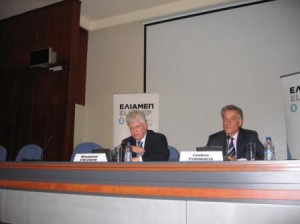It is frequently mentioned that Russia’s relations with the European Union (EU) are those “of strategic partners”. They share a common European civilization and common values. The practical significance of this phrase though is ambiguous, as there is no common meaning inside and outside the EU.
On 6 March 2009, ELIAMEP organized a lecture delivered by Ambassador Vladimir Chizhov, Permanent Representative of Russia to the European Union. Ambassador Chizhov elaborated on the significance of the strategic relationship between Russia and the EU, by analyzing current and future challenges that this relationship may face.
The current financial crisis brought up the increasing interdependence of states, not only in the financial and energy sectors but also in the political one. In 2003 the Greek Presidency started an initiative for partnership in the social, political and economic level. This procedure though is affected by three key factors:
- The ‘objective’ challenges in the framework of economic globalization and the competition among states
- The special character of the EU and the internal problems that it faces absorb a lot of effort from the external problem it faces
- The effects of the EU’s enlargement to the east. Characteristically in terms of commerce the enlargement made Russia the third largest commercial partner of the EU, after the USA and China. At the same time it brought in “imaginary afflictions” which, according to Ambassador Chizhov, stem from the period of the USSR or even from the Russian empire and constitute a catachresis of the euro-solidarity of the Union to benefit bilateral interests.
Russia and the EU should work together to face common problems and more specifically:
- Α) The challenges of the financial crisis, not only focusing on the problems of the Russian economy. According to Ambassador Chizhov the problems Russian economy is facing can be dealt with the federal reserves of Russia.
- Β) The issue of energy security. At this point the Ambassador mentioned that energy dependence of European states will carry on for at least three decades, while it is a fact that Russia could not use the energy issue as a political weapon.
- C) Referring to the EU’s and NATO’s enlargement, Ambassador Chizhov demarcated the two organizations mentioning that NATO is trying to solve problems of the 21st century by using mechanisms of the 20th century. On the other hand, the EU is a modern institution and a possible enlargement would bear no problem for Russia under the condition that the terms of accession are respected by both parties.
Russia’s proposition for a new security treaty was based on these arguments, in order to create a new commonly accepted legal framework. Ambassador Chizhov concluded with the thought that there is room for improvement and in his words «business should be better than usual».
See the interview with Ambassador Vladimir Chizhov.




